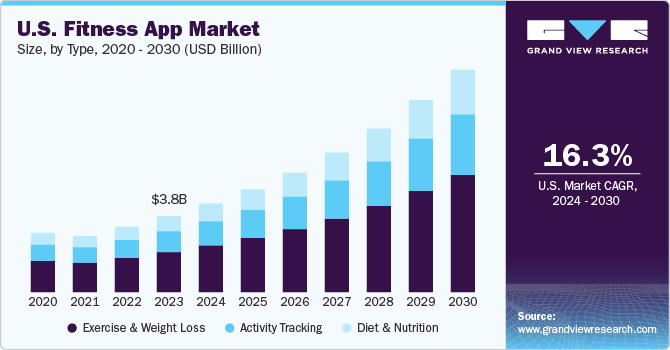Fitness App Market Size, Share, Trends And Forecast 2030
The global fitness app market size is expected to reach USD 4.8 billion by 2030, according to a new report by Grand View Research, Inc. It is expected to expand at a CAGR of 17.6% from 2022 to 2030. Fitness is one of the key segments in the IT industry, which is exhibiting immense growth for the past 10 years in the U.S. This can be attributed to a range of factors, including people spending more time online, increasing awareness regarding the benefits of wearable devices, and the growing spending power of middle-income households. An increase in the usage of smartphones by people of all income groups is also contributing to a rise in the adoption of fitness apps. This has been indicated by a change in the market share trend since 2013, wherein the Asia market outperformed the North American fitness apps market. This is majorly owing to a difference in the target population, wherein adoption was reported to be high in countries, such as China and India.
The COVID-19 pandemic has resulted in a
transition of consumers from traditional gyms and fitness studios to virtual avenues.
Moreover, the growing trend of online training and home exercise among various
target groups has led to an increase in the usage of fitness apps, further
contributing to the market growth. As per an article issued in the World
Economic Forum in September 2020, the downloads of fitness apps have increased
globally by 46%, and the market is expected to grow further owing to the
increasing adoption of smart wearables, smart devices, and smartphones.
Moreover, an increase of 48.0% in the revenue generated by fitness apps was
witnessed in 2020 over 2019 owing to the growing adoption of these apps during
the pandemic.
Moreover, along with a rapid increase in
downloads, fitness apps registered an increase in the number of daily active
users (DAUs). India registered the largest increase in its DAUs with an
84.0% increase, accounting for approximately twelve million new
fitness app users. MENA registered the second-highest growth in accordance with
downloads, estimated at 28%. However, America registered the lowest
increase at a growth rate of about 8.0% during the pandemic. In addition,
despite the availability of several free or cost-effective fitness apps in
stores, it is anticipated that the demand for these apps will reduce over time
as other app vendors are now shifting their focus toward areas such as women's
health, diet/nutrition information, and medication reminder.
Request Free Sample
Report: https://www.grandviewresearch.com/industry-analysis/fitness-app-market
Fitness App Market
Report Highlights
·
The exercise and weight loss segment
emerged as the leading type segment in 2021 with a revenue share of over 50.0%,
owing to the increasing instances of obesity
·
By platform, the iOS segment accounted for
the largest revenue share in 2021, owing to the increased adoption of this platform,
especially in countries such as Egypt, India, Brazil, Ireland, Portugal,
Turkey, and South Africa
·
Based on devices, smartphones accounted for
the largest revenue share in 2021. Wearable devices are projected to expand at
the fastest CAGR during the forecast period
·
North America accounted for the largest
revenue share in 2021 due to the high penetration of smartphones, increasing
awareness pertaining to health and wellness, and the availability of several
fitness apps
Key Companies & Market Share Insights
Key players are introducing fitness apps to cater to the growing
consumer demand, which is projected to drive the market globally. Moreover, new
functions and features are added to enhance the customer experience. For
instance, in June 2020, HealthifyMe, a health and nutrition app, launched
HealthifyMe Studio to provide live and interactive workouts. In addition,
competitive rivalry in the market is high as this industry is highly
fragmented, which leads to prolonged market competition, with innovations often
used to influence buyers. Moreover, aggregated growth of the online/virtual
fitness market worldwide is significantly high, leading to increased growth in
the market for fitness apps; therefore, product differentiation is expected to
be a primary objective in the marketplace. Moreover, fitness app developers are
striving to increase their market shares through the introduction of innovative
fitness and health-related platforms and digitally integrated medical devices.
Some prominent players in the global fitness app market include: Adidas,
Appster, FitnessKeeper, Fitbit, Azumio, MyFitnessPal Inc., Noom, Nike, Under
Armour, WillowTree, Polar Electro, Kayla Itsines, Google, Fooducate, ASICS
America Corporation

Comments
Post a Comment